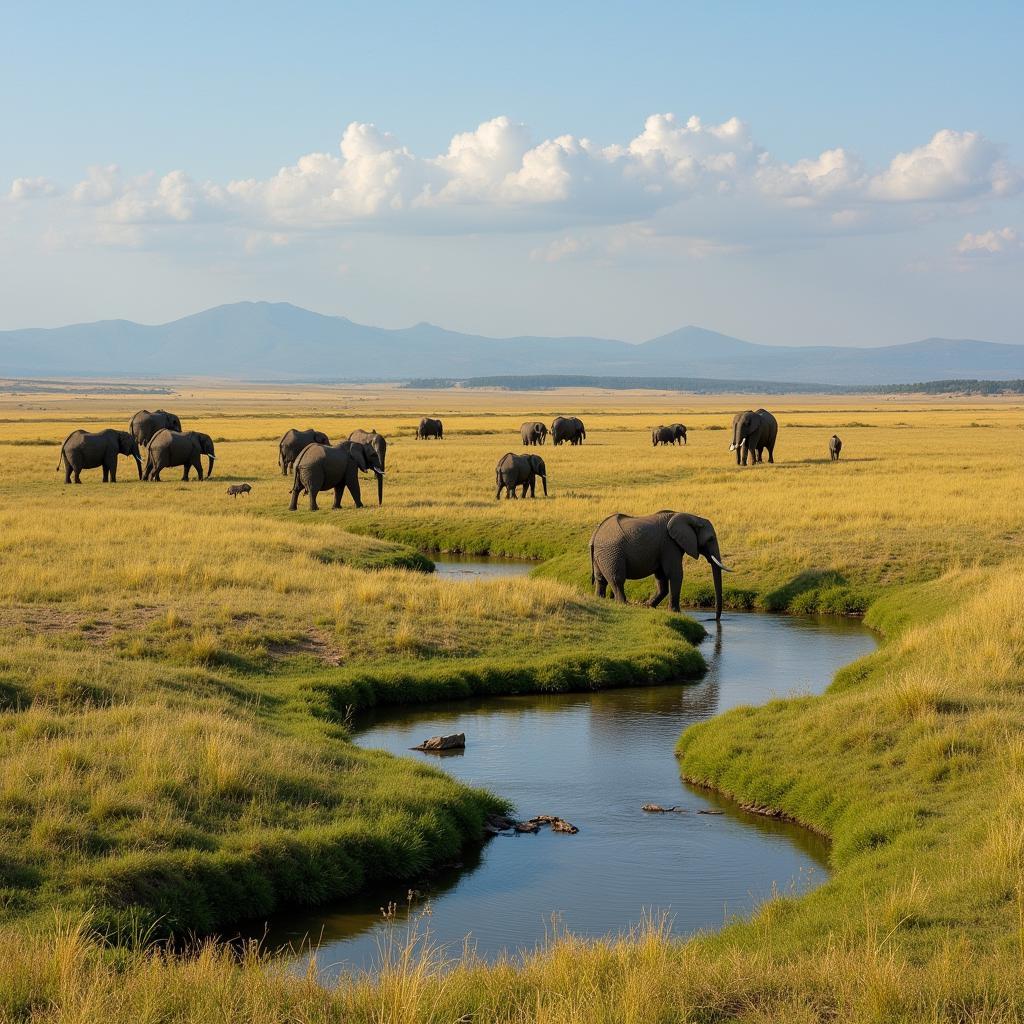The African Elephant: A Majestic Giant of the Big Five
The African elephant, a prominent member of the Big Five, embodies the raw power and ancient wisdom of the African wilderness. These magnificent creatures play a vital role in the ecosystem and captivate the hearts of those fortunate enough to encounter them. Let’s delve deeper into the fascinating world of these gentle giants. african elephant big five
Understanding the African Elephant within the Big Five
The term “Big Five” originally referred to the five most difficult animals to hunt on foot in Africa. Today, it represents the iconic animals that draw tourists from around the globe: the lion, leopard, rhinoceros, Cape buffalo, and, of course, the African elephant. The African elephant holds a special place within this prestigious group, symbolizing both strength and vulnerability.
The Two Distinct Species: Bush and Forest Elephants
It’s important to distinguish between the two species of African elephants: the African bush elephant and the African forest elephant. The bush elephant, the larger of the two, roams the savannahs and grasslands, while the forest elephant inhabits the dense rainforests of Central and West Africa. Both play crucial roles in their respective ecosystems.
The Crucial Role of Elephants in the African Ecosystem
African elephants are keystone species, meaning their presence significantly impacts the environment. They create pathways through dense vegetation, allowing smaller animals to navigate. Their feeding habits help shape the landscape, and their dung disperses seeds, promoting plant growth.
How Do Elephants Contribute to Biodiversity?
By consuming large quantities of vegetation, elephants prevent the encroachment of bushes and trees, maintaining the open grasslands that support a wide range of grazing animals. Their foraging also creates waterholes, providing vital resources for other wildlife during dry seasons.
Dr. Anika Moolman, a renowned wildlife biologist, states, “Elephants are the architects of the African savanna. Their influence on the environment is profound and far-reaching.”
 African Elephant Impact on Ecosystem
African Elephant Impact on Ecosystem
Threats to African Elephants and Conservation Efforts
Despite their immense size and strength, African elephants face significant threats, primarily from poaching for ivory and habitat loss due to human encroachment. These threats have drastically reduced their populations over the decades.
What is Being Done to Protect African Elephants?
Numerous organizations and governments are working tirelessly to combat poaching and protect elephant habitats. These efforts include anti-poaching patrols, community engagement, and the establishment of protected areas.
“Conservation is a collaborative effort,” says Joseph Ndungu, a leading conservationist in Kenya. “It requires the involvement of local communities, governments, and international organizations to ensure the long-term survival of these magnificent animals.”
african bush elephant big five animals
Experiencing African Elephants in the Wild
Witnessing African elephants in their natural habitat is a truly unforgettable experience. Several countries in Africa offer incredible opportunities for elephant viewing, from guided safaris to ethical elephant encounters.
Where Can I See African Elephants?
Countries like Botswana, Kenya, Tanzania, and South Africa are renowned for their thriving elephant populations and offer diverse safari experiences.
african elephants have ears shaped like the continent of africa
Conclusion: The Future of the African Elephant
The African elephant, a symbol of Africa’s wild beauty, remains an integral part of the Big Five. Protecting these magnificent creatures requires ongoing conservation efforts and responsible tourism. By understanding their significance and supporting their protection, we can ensure that future generations can continue to marvel at the majesty of the African elephant. african hot big
FAQ
- What is the lifespan of an African elephant? (African elephants can live up to 70 years in the wild.)
- How much do African elephants eat in a day? (An adult African elephant can consume up to 300 pounds of vegetation daily.)
- What are the main threats to African elephants? (Poaching for ivory and habitat loss are the primary threats.)
- How can I help protect African elephants? (Supporting conservation organizations, choosing responsible tourism operators, and spreading awareness are effective ways to help.)
- Where can I learn more about African elephant conservation? (Numerous reputable organizations provide valuable information and resources online.)
- How do elephants communicate? (Elephants communicate through a variety of vocalizations, including rumbles, trumpets, and roars, as well as through body language and seismic signals.)
- What is the social structure of an elephant herd? (Elephant herds are matriarchal, led by the oldest and most experienced female.)
Need support? Contact us 24/7: Phone: +255768904061, Email: [email protected] or visit us at Mbarali DC Mawindi, Kangaga, Tanzania.


